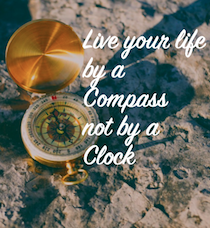VHF Refresher
VHF Radio Refresher – Marine Radios
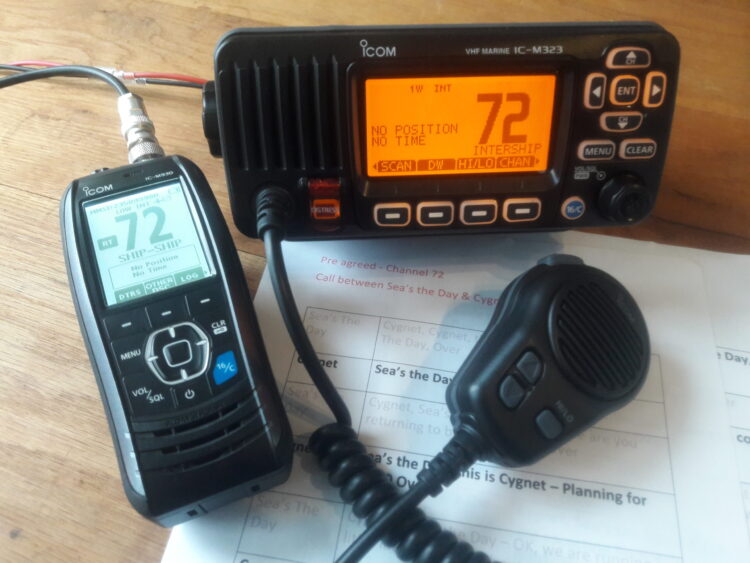
Introduction & Safety to our VHF Radio Refresher!
This week with our Training Talks we have been looking at VHF radios. We can never cover all the materials in a short one hour session (or a short blog!) so these were very much aimed at being refreshers and reminders for those with licenses and an introduction to why a course is a good idea for those without. Aimed at those boating in the UK. It is important to remember that on these sessions and courses, we use Training Radios, they are specifically designed and licensed for us to use them online and not transmit outside the room. You cannot practice distress calls on real sets!
Why bother with a VHF Radio – why not just carry a mobile phone?
The reasons will differ in different locations and for different boaters but there are many advantages to using a VHF on board. The VHF is designed to work on the water, they are usually waterproof and ergonomically designed for wet hands! They may provide us with a position, allow us to speak to multiple people at once and have potentially have direction finding capability for rescue services to find us. Depending on the type we may have better battery facilities than a smartphone. Our unique identifier on most of our radios also enables emergency services to match up contact information to ascertain who it is and where we are if we need help.
The mobile phone is of course useful at sea. It is great for calling friends or nearby restaurants and coverage may be fine but it is not designed to be used at sea. Many mobiles are not waterproof and who has tried to operate a touchscreen with wet hands! In the case of emergency it is harder for the rescue services to locate us if we are not quite sure where we are ourselves. It also means that we only speak to one person when requesting help and boats nearby that might be able to offer immediate assistance don’t know that we require help.
Licensing & The Law:
Dom and I have always tried to make it clear that we would rather encourage you to get the paperwork right by explaining the benefits and advantages rather than beating you with a legal stick! Feel free to approach us with individual questions. Whether it’s a new radio or you’ve had the radio for years please just ask. So what do you need?
Authority to Operate
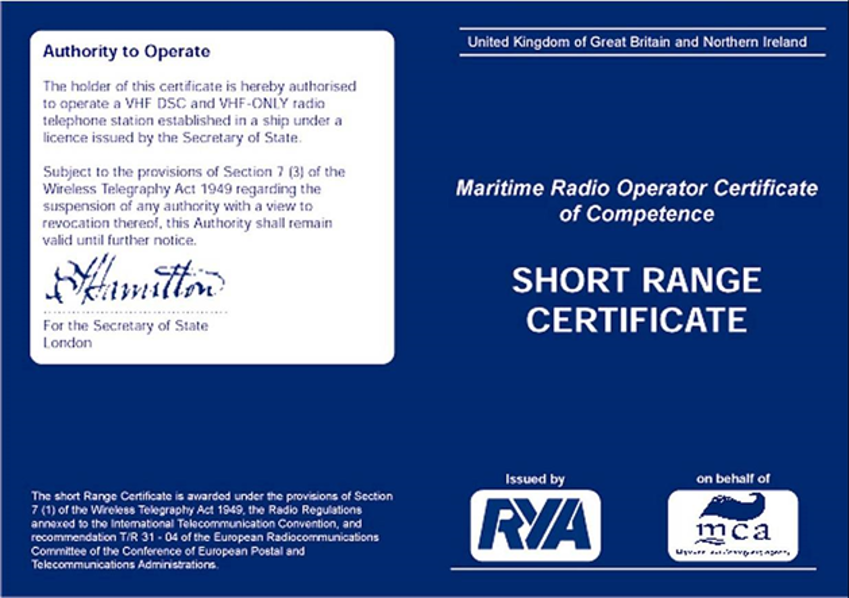
You will require an Authority to Operate a VHF Marine Radio. This is about you as a person using any VHF. The qualification is obtained by taking the SRC (Short Range Certificate) Course, often referred to as the VHF course. This is a course we run. You can take the course online or in the classroom (when we are all allowed back). The classroom course takes a day usually.
The online course can be accessed as and when you like. Either all in one sitting or over a series of weeks/months. You expect to spend about 8-10 hours on it. You will receive a course book to keep. Course (prices correct June 2020) is £65 online or £85 in classroom. There is a final assessment to sit which needs to take place at an RYA Training Centre like ourselves. This costs £60 payable to the RYA. Course details here: VHF Courses
Ship Radio License:
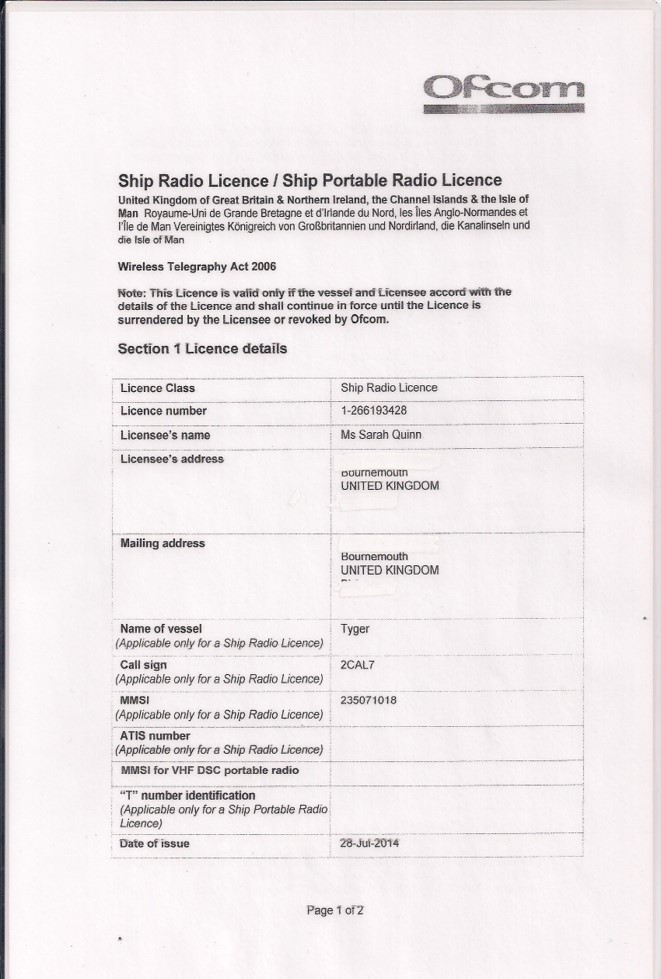 It sounds very grand particularly for those of us with small boats but, in essence, any radio needs to be licensed. This is FREE of charge online via OFCOM. There are two difference types of licenses. If you have a fixed VHF set wired in on your boat you require a Ship Radio License. If you have a handheld or portable you require a Ship Portable Radio License. Any other equipment that you have onboard which can transmit a signal also needs to be included on the license. There are a few exceptions so give us a call if unsure.
It sounds very grand particularly for those of us with small boats but, in essence, any radio needs to be licensed. This is FREE of charge online via OFCOM. There are two difference types of licenses. If you have a fixed VHF set wired in on your boat you require a Ship Radio License. If you have a handheld or portable you require a Ship Portable Radio License. Any other equipment that you have onboard which can transmit a signal also needs to be included on the license. There are a few exceptions so give us a call if unsure.
Why bother with these bits of paper?
The Authority To Operate is simple to obtain once you have done the course. It is an assessment but no need to be afraid of that. We are both instructors and assessors and all we want to know is that you have understood the information on the course. Any issues we will carrying on teaching until you are ready but the reality is that if you have completed the course you will be fine. You don’t need any prior knowledge to take the course and it is suitable for skippers or crew. It is also a legal requirement to have the qualification (otherwise than in an emergency)
Why take the course? We honestly feel that you will become a safer and more confident boater with the knowledge gained. Some comments from previous clients
“Absolutely superb course. Really thorough. Felt that we were taught everything that we needed. Managed to combine really good training with a great atmosphere.”
“Very impressed would recommend the course”
“Very good course, informative with new items highlighted throughout discussions”
Coordinated Information:
The radio license from OFCOM again is not only a requirement but it brings together all the contact information in case of an emergency. If you have a DSC radio (one with a ‘red button’) you will be allocated a MMSI number. This is a unique number to that radio and is transmitted during digital calls. Should you be reported missing or overdue the coastguard may send a routine call to you, to check you are ok.
A boat was reported overdue locally, last week. The coastguard sent a routine call to the boat radio but received no reply. As a result the lifeboat was launched. Fortunately, all ended well as the boat was found at anchor staying overnight in an inlet. Had the radio have been on it could have prevented a search operation.
Confidence:
We sometimes have people tell us they only plan to use the radio in an emergency so aren’t bothering to get the paperwork in place. The reality is that the course will give you confidence to trouble shoot your radio to ensure you have the maximum chance of rescue. The license ensures the coastguard has contact details and information to hand.
A few years ago a lady approached me to book a course for her husband. She then asked if I thought she should do the course – she was reluctant due to the assessment. I suggested she came along, did the course and then made a decision as to whether to sit the assessment. She took it and of course got full marks, having enjoyed the course. But the real point is that 10 days later the same lady came back to see us and they had a fire on their boat that weekend. She said she was amazed at how calm she was as she felt able to deal with the radio communications whilst her partner investigated the fire. All ended well and the fire was fortunately confined to the engine bay. She was incredibly glad to have taken the course and felt it had added to their safety.
Different types of Radio:
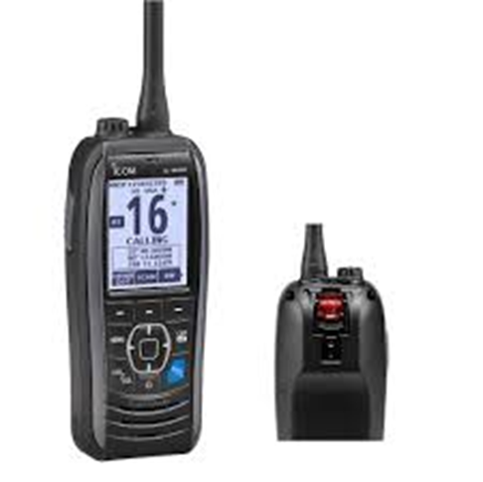
So many choices but first of all do you need a fixed radio, a handheld portable or a combination? Next do you need a DSC radio? Which leads us to ask what is DSC? DSC is Digital Selective Calling and rather than just voice calls the radio can send digital transmissions too. For most people now a DSC radio (one with a ‘red button’) is a good option. You can very quickly send a distress message simply by pressing and holding the red button in. It will in most cases then send your location and identity to not only the coastguard but other boats nearby.
Two limitations of DSC: They are slightly higher cost and the battery life is less for portables.
There are several manufacturers around. Personally, we tend to use Icom due to their amazing customer service, the menu structures and our own experience of how durable the radios are. However, there are other good manufacturers as well and it is a personal choice on cost and features required.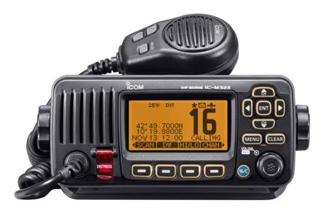
If your radio is a digital set, does it have an information source for it’s location? Many have inbuilt GPS receivers now but if your radio says no position found it is important to check this out as a significant safety feature is not working.
Radio Discipline:
We often talk about brevity clarity and discipline on the radio. It is important to understand how to use the radio properly and follow the structures. This enables more people to use the radio and may prevent you from blocking an emergency call. We talked about prohibited actions, prowords, range, low power and high power, channel use and the phonetic alphabet. Who can you call? What are you allowed to discuss?
If you heard the words ‘Seelonce Mayday’ broadcast over the radio would you understand what that meant? It is important for safety that you do and we cover all of these topics on the course.
Use of the Radio and Settings:
We talked about how listening to your radio can contribute to your safety. The benefits of harbour control channels and knowing shipping movements will greatly improve not only your safety but prevent you being a hindrance! After your course where do you find information about which channels to use? Almanacs, charts, harbour guides and websites are all important sources of information.
The ‘National Coastwatch Institution’ make to our boating lives. ‘NCI’ have a dedicated channel (65) and can provide radio checks plus information on weather.
This led nicely onto to the various features, buttons and setting on VHF radios. From backlighting to volume to squelch and a discussion about how useful dual watch can be. This is particularly in busy waterways or for those carrying out safety boat patrols.
Calls – Routine, Distress, Urgency and Safety
Next up were calls, routine voice calls, routine digital calls and onto distress, urgency and securite calls. Some who have not undertaken training will dismiss the need to know about routine digital calls. However, digital calls can actually increase your confidence and use of the radio. If you use DSC there is no need to talk on channel 16 which makes the process quicker and less intimidating.
Dom demonstrated the benefits of understanding what to do if you receive a routine call. Often when a radio beeps people turn it off without reading the screen – what if it is the coastguard calling you to check an overdue report? The great thing about digital calls is that whatever channel you are on your radio will beep if you receive a digital call and when you accept the call it will automatically default to the channel the caller has chosen.
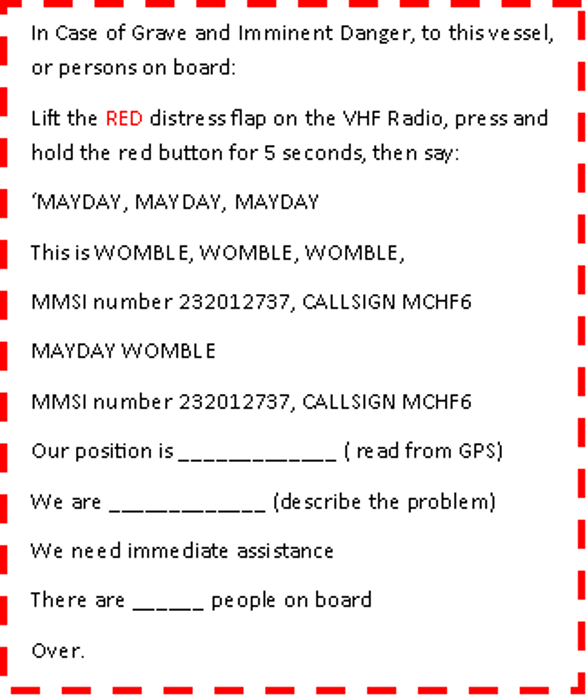
We ran through the Mayday call, when to make it and how. The level of detail in the call is important too. It is a great idea to have a proforma of the call written out and kept next to the helm position to ensure all crew know what to say. None of us know how we would react in an emergency so why not make it easier?
Free template available here: MCA Mayday Card
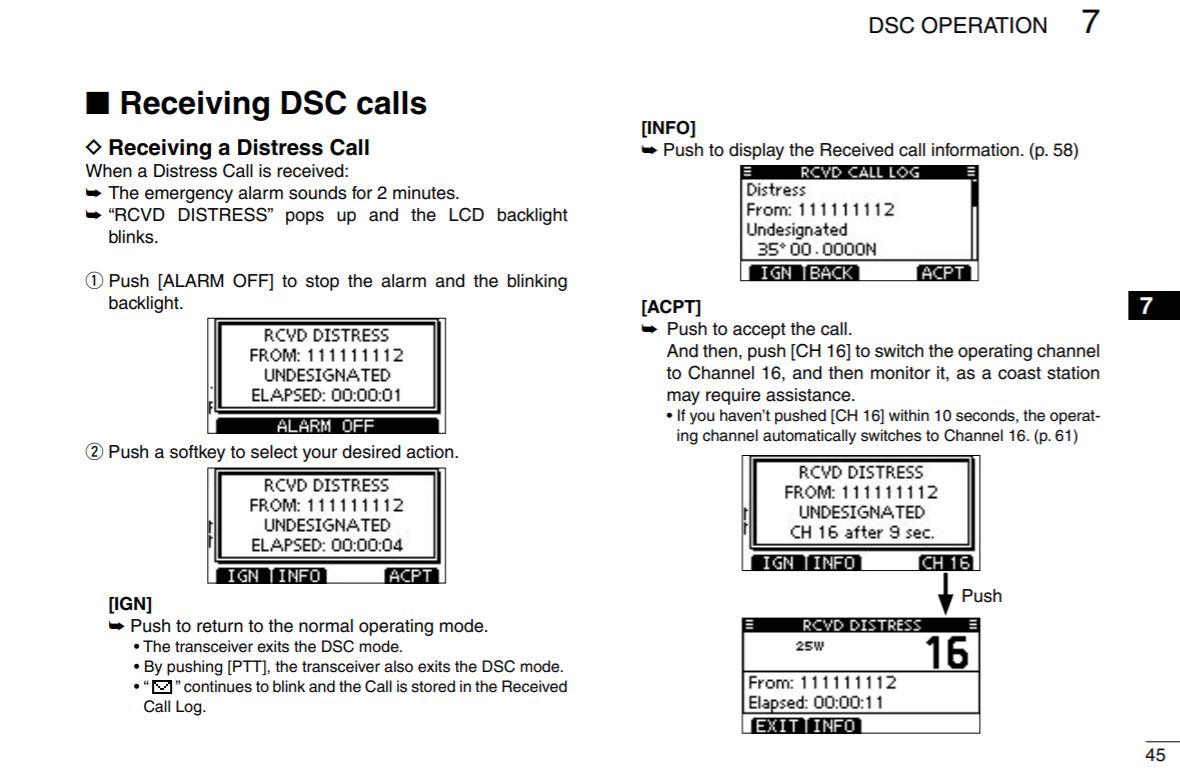 One query raised was about accepting Mayday messages – I have included a page from the manual for the Icom M323 to explain the process. If you don’t accept the call the radio will not default to channel 16 for you to hear the message. Don’t forget we are talking about Class D receivers, those aimed at the leisure market. If you work in the emergency services you may well have a different type of set.
One query raised was about accepting Mayday messages – I have included a page from the manual for the Icom M323 to explain the process. If you don’t accept the call the radio will not default to channel 16 for you to hear the message. Don’t forget we are talking about Class D receivers, those aimed at the leisure market. If you work in the emergency services you may well have a different type of set.
Scenarios and ‘Securite’
We then looked at the situations we would use for the different types of call. Ultimately, do not be so afraid of making the wrong call that you don’t ask for help. The coastguard are professionals ready to receive and help with our calls. They will guide you through the process. The earlier you call and ask for advice the easier any situation will be to manage for all concerned.
Finally, we looked at the importance of accepting and listening to safety alerts. These give us valuable information on anything from a buoy being out of place, divers in the water, new gale warning or navigational hazards such as submerged containers. How much safer would your boating be if you listed to these?
Manuals:
Don’t underestimate the value you will get from reading your manual. If you have already taken a course to gain the fundamentals, you will find that reading the manual for your own boat will complement your training and allow you to get the maximum use form your radio. We go afloat to get away from people but taking the time to learn how to use your radio effectively could make the difference to looking after you or your crew or indeed helping someone else in need. An example manual for the Icom M323 is available here: Icom Manual
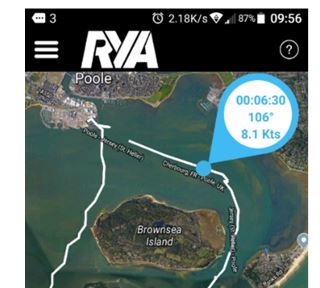 Safetrx:
Safetrx:
Don’t forget that the free RYA Safetrx app feeds in to the overall safety system. Part of the registration includes the ability to include your MMSI number, call sign and Boat name. The Coastguard can link all the information together and attempt to call if you are reported overdue.
Further information here: RYA SafeTrx
Safety Briefings:
It is important to ensure that crew know how to use the radio. The basics of how to raise a distress alert, to hold in the push to talk button to talk but release it to hear a reply and how to work out where they are to give a position.
Conclusion:
Understanding your radio and being licensed makes your boating safer and more enjoyable. The course should not be seen as a trial, it’s something to engage with and to apply to your boating.
It is important we follow the protocols to protect everyone but don’t be afraid to use the radio if need for both routine or emergency calls.











